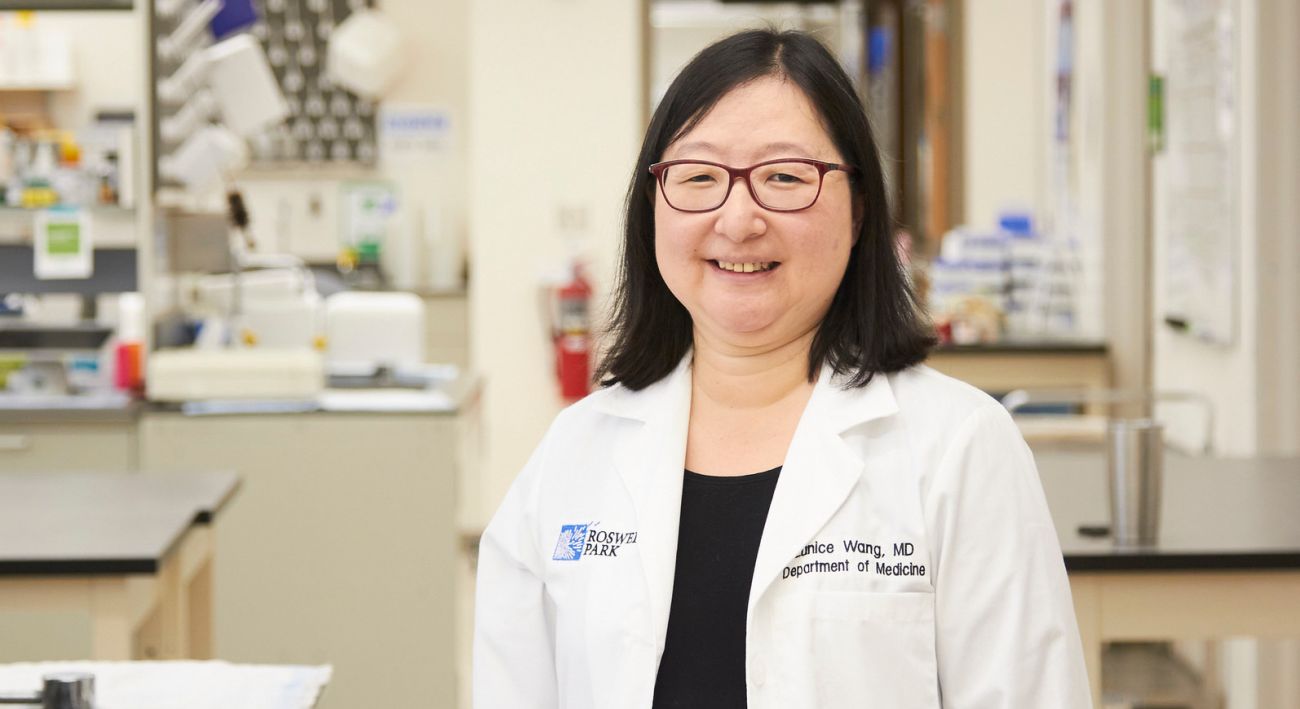Oral presentation highlights refinement of treatment regimens for challenging disease
- Research supports adding antibody-drug conjugate to AML therapy
- Retrospective analysis looked at 113 patients from 2015-2022
- Experts say regimen should be considered for wider treatment adoption
BUFFALO, N.Y. — Eunice S. Wang, MD, Chief of Leukemia at Roswell Park Comprehensive Cancer Center, led a research effort that supports the addition of gemtuzumab ozogamicin—a CD33-directed antibody-drug conjugate—to standard induction chemotherapy for the treatment of newly-diagnosed intermediate-risk cytogenetic acute myeloid leukemia (AML). The study will be highlighted during an oral presentation at the 64th annual meeting of the American Society of Hematology (ASH), held December 10-13 in New Orleans, Louisiana.
“Despite the approval of many novel agents for AML, this still remains a clinically aggressive and challenging disease with an overall 5-year survival rate of only 28%,” says Dr. Wang. “Further improvements and refinement of our treatment regimens with the appropriate incorporation of these new approved agents is urgently needed to improve the lives of patients with this disease today. Roswell Park’s leukemia service is hoping to contribute to this.”
Gemtuzumab ozogamicin is currently approved in combination with standard induction chemotherapy for the treatment of newly diagnosed and refractory/relapsed CD33-positive AML. However, since the benefit for patents with intermediate risk cytogenetics is considered less favorable, many clinicians don’t routinely include it in the treatment regimen for these individuals.
This stems from a lack of information on other predictive biomarkers for response in this group and concerns related to additional side effects, notes Dr. Wang. “However, here at Roswell Park, we do in fact routinely give gemtuzumab ozogamicin plus intensive chemotherapy and therefore we decided to look at our own center data to see if these questions/concerns could be addressed.”
In this retrospective analysis, Dr. Wang and colleagues reviewed patient charts for all adults diagnosed with intermediate risk AML who were treated with either intensive chemotherapy or intensive chemotherapy plus gemtuzumab ozogamicin between 2015 and 2022. Data from these patient charts were collected and then analyzed with statistician support.
Of the 113 patients studied, 33 received gemtuzumab ozogamicin in combination with intensive chemotherapy and 80 were administered intensive chemotherapy alone. The researchers observed higher rates of MRD-negative complete remission among patients who received the combination approach versus those who were administered induction chemotherapy alone. The patients treated with gemtuzumab ozogamicin also had lower rates of relapse and were more likely to undergo hematopoietic stem cell transplantation.
Dr. Wang and colleagues also observed a superior, yet not statistically significant, median overall survival among patients in the gemtuzumab ozogamicin plus intensive chemotherapy group when compared to those in the intensive chemotherapy only cohort.
While the addition of gemtuzumab ozogamicin was associated with a non-significant trend towards improved overall survival, Dr. Wang emphasizes the need for longer follow-up to better understand the absolute survival advantage of this treatment regimen. The Roswell Park team would also potentially like to compare and/or combine their results with those obtained at other academic medical centers, particularly as they relate to mutation biomarkers.
“These results confirm that the routine addition of gemtuzumab ozogamicin to intensive chemotherapy is beneficial for these patients and that this regimen should be considered for wider adoption for the treatment of intermediate risk fit AML patients as upfront therapy,” Dr. Wang concludes.
ASH 2022 Presentation Details
Abstract 58: Gemtuzumab Ozogamicin Plus Standard Induction Chemotherapy Improves Outcomes in Intermediate Risk Cytogenetic Acute Myeloid Leukemia
Presenting author: Mina Abdelmalek, MD, State University of New York at Buffalo, Buffalo, NY
Time/date: Saturday, December 10, 2022: 10:15 AM CST
Session: 613. Acute Myeloid Leukemias: Clinical and Epidemiological: Innovations in Prognostication for Patients with Acute Myeloid Leukemia Hematology Disease Topics & Pathways: Research, Acute Myeloid Malignancies, AML, Clinical Research, Diseases, Myeloid Malignancies
###
Roswell Park Comprehensive Cancer Center is a community united by the drive to eliminate cancer’s grip on humanity by unlocking its secrets through personalized approaches and unleashing the healing power of hope. Founded by Dr. Roswell Park in 1898, it is the only National Cancer Institute-designated comprehensive cancer center in Upstate New York. Learn more at www.roswellpark.org, or contact us at 1-800-ROSWELL (1-800-767-9355) or ASKRoswell@RoswellPark.org.
Rebecca Vogt, Media Relations Specialist
716-845-4919; rebecca.vogt@roswellpark.org
